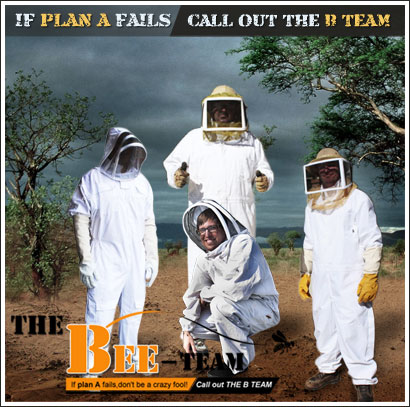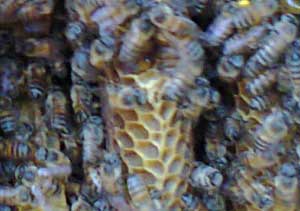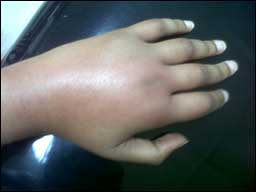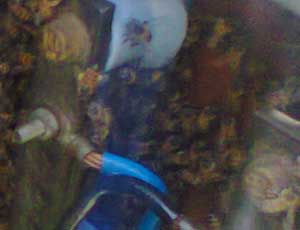 |
082 655 3463 sales@beeteam.co.za |
||||||||||||||||||||||||||||
| Home About Bees Bee Removal Contact Us | |||||||||||||||||||||||||||||
Honey Bee Removal
Bees in January
It may seem harmless at first, but our South African honey bee (Apis Mellifera Scutellata) are industrious little creatures, they will settle and will quickly start to expand, building honeycomb and claiming the territory as their own. If this happened in secluded areas where there were no humans, children or pets it would be as nature intended it, unfortunately bees choose to make there hives all around our communities and this can be dangerous to our children and pets. If bees have taken up residence in or around your property do not hesitate to contact us for advice on how to best deal with the safe removal of the bees for both us and them. Bees in DecemberDecember in South Africa is probably the warmest month in the year, and the warmth and rainfall will cause plants to grow and bloom in abundance, in addition to this it is a holiday month and people will be spending a lot of time out of doors. From picnics to trips to the beach or just sitting on the patio having a lazy lunch or a cool drink. With the garden in bloom and the abundance of sweet smelling food and drink, you will undoubtedly attract a few bees. Don't be alarmed, they will not sting unless you do something to make them feel the need to protect themselves, and they probably haven't settled the colony in your garden. These are probably just bees out foraging that came across the appetising scent of what you were eating or drinking. Should a bee land on your cooldrink can or anywhere near you, do NOT flap your hand at it to try and make it go away, if the bee feels threatened it may sting you as a defence. Rather allow it to sit for a few seconds and when it flies off remove or cover the items that are attracting it. Always bear in mind that bees do not fly around looking for someone to sting, stinging causes the sting to rip out of their bodies and they die, it is the final attempt at protecting themselves or their colony. If bees have migrated to your garden and you would like them to be removed, play it safe and have a professional do the removing. A good bee remover will not kill the bees but rather relocate them to an area where they can forage without causing alarm or distress.
Who do I call to arrange for an experienced bee remover to visit my property and remove bees We remove unwanted bees in Johannesburg, and sometimes further afield covering most of Gauteng. Call us now on 082 655 3463Why do you have bees? Find out more about bee removers Bees seek out spaces capable of accomodating their hives, sometimes
flying great distances when relocating, even forming special 'bivouacs'
at temporary stop off points by linking their bodies together to create
a structure around the queen. Bees swarm
around a queen, building their hives to protect the queen and nurture
the young she produces. Call us now on 082 655 3463
When that perfect spot the bees are looking for happens to be under your stairs or in the eaves of your building you are going to come into conflict with a robust species perfectly capable of defending itself and would be well advised to call in The Bee Team. Safety first, and considering the environment being the priority it is these days it makes sense to ask a beekeeper with the necessary knowledge to remove bees for you. How does experience and safety procedures affect Bee Removal?Bee removal in Johannesburg has never been eaiserWord of thanks 19 November 2013Hi Thank you for the good service and response by your team. Kind regards, (Rivonia, Johannesburg) Testimonial 28 October 2013On the discovery of a beehive in our water meter enclosure, I completed an on-line enquiry to The Bee Team. Imagine my surprise when within 5 minutes of pressing the send button, I received a call from The Bee Team saying they could be there within the hour!.... what incredible service! As I am only 7km from home I said I would meet them there.... they even beat me to my house, and indeed had started removal before I arrived!.... about 30 minutes later job done no harm to anyone, and the bees removed harmlessly ready for relocation. Job well done, professionally and politely..... should I need bee removal service again, I know who I will be calling! Peter Edwards Testimonial 15 January 2013Hi Craig, Peter was here today to remove the bees between no 19 and 20! I've now met 2 of your team members . What an awesome team - I have so much respect for all of the work you do to save our environment. I had to leave before Peter was done and really sad to have had to do this! I seem to be hooked on the wonderful life of our bee world. Thank you so much for an awesome service. Kind Regards Taking all the necessary tools as well as the care and precautions
one learns in the beekeeping trade on to a site in the South of Gauteng
Province, where bee infestations are common, or to one of the large
number of locations from which we have removed bees in Cape Town and
Durban, to remove a hive of bees is exciting work. The option of poisoning or exterminating bees is unacceptable to knowledgeable people because bee removal and relocation to a safe environment is environmentally responsible. It is a healthier option too considering the absence of the toxic chemicals used by exterminators in days gone by. Disposing of a hive of bees without bringing harm to the environment is a satisfying result in itself but the cost effectiveness of thinking like a beekeeper means that astronomical pest control bills can be avoided in the case of bee infestations by calling on the age old craft, science and art of the beekeeper. The Bee Team is registered with the Department of Agriculture to deal with bees in the daily running of our business. We are bee removers and bee-keepers which puts us in the unique position of knowing how bees behave under various circumstances. This is why we have added public liability insurance to the value of R2 million to our existing insurance package. This does not mean we are any less safety concious than before, SAFETY is our always our first consideration when dealing with bees. If you want to read about how NOT to remove bees, visit our How Not To Remove Bees webpage. Why are some bees dangerous and others not?Most bees are reluctant to sting. Sometimes there are things that people do which upsets a hive and causes them to become aggressive. Common reasons why bees become aggressive
Bee stings
|
|||||||||||||||||||||||||||||
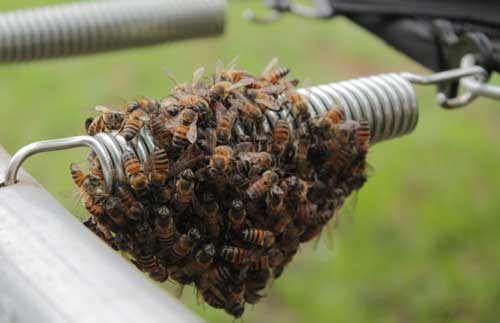 Throughout the Gauteng region we have noticed an increase in the amount of bees that are hiving in the roof or ceiling cavities of peoples homes.
Throughout the Gauteng region we have noticed an increase in the amount of bees that are hiving in the roof or ceiling cavities of peoples homes.
